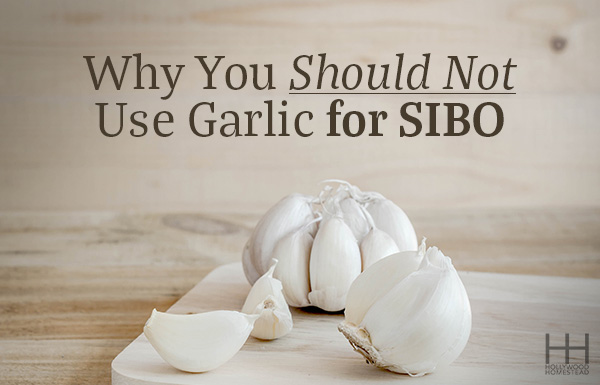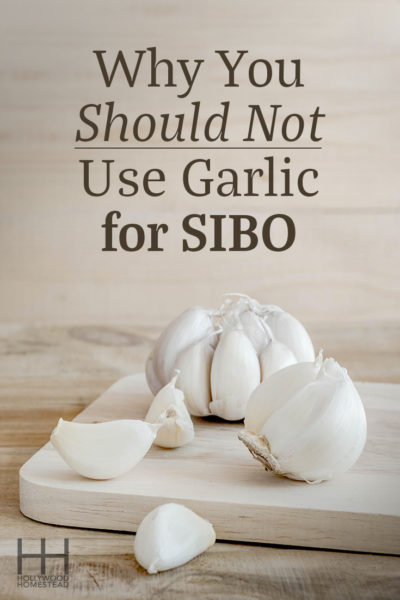
Why You Should NOT Use Garlic for SIBO
Garlic is a hugely popular natural remedy – but if you have SIBO, eating a lot of garlic is not a great idea. That doesn’t mean you’re out of luck! Let’s explore what makes garlic so awesome and how you can get those benefits even if you have SIBO.
Why Taking Garlic for SIBO is NOT a Good Idea
Just because something is completely natural doesn’t make it ideal in every situation, especially if you have SIBO. Garlic is a safe and natural remedy, but eating garlic can still cause problems if you have digestive conditions.
It’s All in the FODMAPs
Garlic is on the no-no list for conditions like SIBO, IBS and fructose intolerance because garlic contains FODMAPs. (You can read more about FODMAPs here.)
This is why garlic can cause digestive symptoms to flare up and set you backward on your road to healing. Unfortunately, this means garlic should be off the menu if you have any chronic digestive issues – especially SIBO.
Garlic vs. Allicin for SIBO
Garlic contains biologically active compounds that can have a powerful effect on your health.
One of the most studied is allicin, a sulfur compound in garlic which naturally protects garlic plants from infection and damage. This compound is released when the garlic plant is damaged (or when you crush garlic cloves, for example).
Allicin is what really gives garlic its health-promoting reputation. The same properties that help protect the garlic plant can help in the human body, too. Here are some allicin benefits we’ve seen shown in research:
- Allicin is a highly potent antibacterial, antifungal, and antiviral compound.
- It has strong antioxidant and anti-inflammatory properties.
- Allicin is associated with benefits that support heart health, like reducing high blood pressure and cholesterol.
Read more about the health benefits of allicin here.
But there’s some good news: you don’t actually need to eat a lot of garlic to get the benefits of allicin!
In fact, eating garlic isn’t the most effective way of getting allicin anyway. You’d have to eat dozens of garlic cloves to get the recommended dose of the compound. Plus, allicin isn’t a very stable compound and breaks down rapidly into other less effective sulfur compounds.
This means that if you or a family member has SIBO, you want to avoid eating garlic and instead look for a quality stabilized allicin supplement. Stabilized allicin capsules are highly concentrated and contain none of the irritating compounds found in garlic that can cause flare-ups.
Stay Tuned…
In the coming weeks, we’re going to talk a lot about what makes garlic so amazing as a natural health remedy (because it’s definitely pretty awesome).
Just keep in mind, the safest and most effective way to get the benefits of garlic when you have SIBO is to use stabilized allicin, like in this Allimed supplement.

Latest posts by Sylvie McCracken (see all)
- Treating H. Pylori (Part 3): What H. Pylori Does to the Body - August 8, 2022
- Treating H. Pylori (Part 2): How H. Pylori is Contracted - August 3, 2022
- Understanding Beef Labels: Organic, Pastured, Grass-Fed & Grain-Finished - July 25, 2022
People with histamine intolerance, can they treat SIBO with Allicin?
What if it shows up high on a food sensitivity panel? Do you believe capsules are fine then also? Thank you!